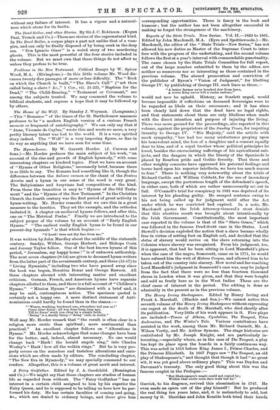Reports of the State Trials. New Series. Vol. IL-1823 to
1831. Edited by John Macdonell, M.A. (Eyre and Spottiswoode.)—Mr. Macdonell, the editor of the " State Trials—New Series," has not allowed his new duties as Master of the Supreme Court to inter- fere with the progress of the undertaking, and the second volume follows the first at a year's interval with commendable punctuality. The cases chosen by the State Trials Committee for full report, out of the large number submitted to them by the editor, are neither so numerous nor so interesting as those contained in the previous volume. The absurd prosecution and conviction of the publisher of Byron's " Vision of Judgment," for libelling George IV. by publishing of George III. such lines as these,—
" A better farmer ne'er brushed dew from lawn, A worse King never left a realm undone,"
would not now be upheld. History, as Scarlett urged, would become impossible if reflections on deceased Sovereigns were to be regarded as libels on their successors ; and it has since been clearly laid down that the dead have no legal rights, and that statements about them are only libellous when made with the direct intention and purpose of injuring the living. There was more ground for the proceedings, also reported in this volume, against the proprietors of the Sunday Times, for imputing insanity to George IV. "His Majesty," said the article with mock sympathy, "has had too many misfortunes preying upon his benevolent mind, the loss of a daughter and a consort equally dear to him, and of a royal brother whose political principles he loved, besides the excruciating sufferings of his agricultural sub- jects, and the dangers in which the liberty of the Spaniards is placed by Bourbon pride and Gothic ferocity. That these and other weighty concerns have oppressed his paternal feelings and borne hard upon his superior intellects, we have too much reason to fear." There is nothing very noteworthy about the trials of Richard Carlile and William Cobbett, for the use of incendiary language, except the portentous length of the defendant's speech, in either case, both of which are rather unnecessarily set out in full. O'Connell's trial for conspiracy in 1831 was deprived of its interest by his pleading guilty. He escaped sentence owing to his not being called up for judgment until after the Act under which he was convicted had expired. In a note, Mr. Macdonell quotes the Irish Attorney-General's stout denials that this abortive result was brought about intentionally by the Irish Government. Constitutionally, the most important case reported in the volume is that of the " Slave Grace," which was followed in the famous Dred-Scott case in the States. Lord Stowell's decision exploded the notion that a slave became wholly free in virtue of setting foot on English soil, and decided that the status of slavery would revive on the slave returning into the Colonies where slavery was recognised. From his judgment, too, it is apparent, that had he been sitting in Lord Mansfield's place when the case of the negro, Somersett, came on in 1771, he would have refused him the writ of Habeas Corpus, and allowed him to be taken out of the country into slavery. How novel and far-reaching Lord Mansfield's judgment in Somersett's case was, may be judged from the fact that there were no less than fourteen thousand slaves in London when it was given, and that they were bought and sold as freely here as in the West Indies These are the chief cases of interest in the period. The editing is done as admirably in the present as in the previous volume.


















































 Previous page
Previous page